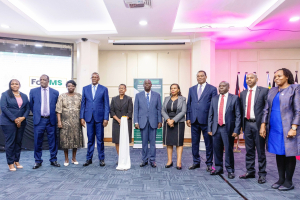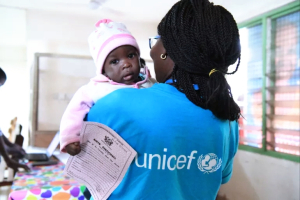Talenteo Streamlines HR and Payroll for Algeria’s SMEs
Two Algerian tech entrepreneurs built a solution to help small and medium-sized businesses manage their human resources more easily and locally.
Talenteo, a SaaS platform developed by a young Algiers-based startup, gives SMEs tools to handle their entire HR cycle — from payroll to onboarding, plus leave, absences, and regulatory compliance. Tarik Metnani and Louai Djaffer launched the startup in 2022.
In June, the company raised an undisclosed six-figure investment from Tunisia-based 216 Capital. This funding will speed up Talenteo’s growth in Algeria and prepare it for regional expansion. The founders plan to move into Tunisia first, then other North African markets.
“We believe that a company’s success relies on investing in human resources. Talenteo was created to help African companies digitize their HR processes to support their growth and impact,” said co-founder Louai Djaffer.
Talenteo positions itself as a local alternative to foreign solutions, which often fail to match African regulatory and linguistic needs. The platform mainly targets businesses with fewer than 250 employees — the core of Algeria’s and Francophone Africa’s economy.
The company says its solution offers an integrated approach that fits local administrative requirements, such as payslip compliance under Algerian law and customized dashboards. Talenteo aims to cut paperwork for SMEs, boost transparency, and professionalize talent management.
Adoni Conrad Quenum
With Zerone AnalytiQs, Abby A. Aidoo Expands Data Access in Africa
Abby A. Aidoo grew up in Ghana and later moved to Canada, building a career at the crossroads of data analysis and digital solutions.
Aidoo co-founded Zerone AnalytiQs in 2022. She serves as co-CEO of this analytics and AI firm, which targets organizations and investors seeking to expand or set up operations in Africa. Based in Vancouver and Accra, Zerone AnalytiQs focuses on making African data easier to collect, analyze, and visualize.
The company’s platform lets businesses, researchers, and institutions gather and structure data from multiple sources. It supports decision-making by turning that information into real-time insights. Users can design surveys, polls, and questionnaires, then reach targeted audiences through a network of African contributors. They can convert raw data into reports, charts, and presentations, and export results in Excel, PowerPoint, or PDF formats for sharing.
Zerone AnalytiQs also built a mobile app, ZeroneData, that rewards survey participants with points redeemable for cash through local mobile wallets. The firm wants to drive innovation and expand data access to help advance Africa’s socio-economic growth.
On June 24, 2025, Google for Startups Accelerator: Africa picked Zerone AnalytiQs among 15 startups to join its ninth cohort.
Aidoo balances her startup work with her role as director of the Mastercard Foundation Scholars Program at the University of British Columbia. She holds a bachelor’s degree in accounting from the University of Ghana and an MBA from UBC’s Sauder School of Business.
Her professional journey began in 2016 at Mangifera Energy in Ghana, where she worked as a financial assistant. She moved on in 2020 to become business development manager at SBINC Solutions, which focuses on engineering and civil works. In 2021, she worked as a customer success account manager at Microsoft.
In 2023, she took the role of operations director at DBS Cyber, a U.S. firm specialized in AI training and solutions. Between February 2024 and February 2025, she served as program developer and community development manager at Innovation UBC, which supports researchers and innovators building a sustainable future.
Melchior Koba
Niger Moves to Modernize ID System with Biometric e-ID and e-Passport
Niger is launching a major overhaul of its identification system to boost security and improve administrative efficiency. The government will use biometric technology to modernize ID documents and better serve citizens.
On June 27, in Niamey, Niger’s Minister of State for the Interior, General Mohamed Toumba, signed two memorandums of understanding with Wissal Samtali, director of the Libyan firm Al Itissan Al-Jadeed, which specializes in biometric and digital identity solutions. These agreements set up a public-private partnership to revamp Niger’s identity documents.
Signature ce Vendredi 27 juin 2025 à Niamey, de deux mémorandums d'entente entre le Ministre d'État, Ministre de l'Intérieur de la Sécurité Publique et de l'Administration du Territoire, le Général de Division Mohamed Toumba et la Directrice de la société Al Itissan Al-Jadeed… pic.twitter.com/MYAo9k7ib1
— النيجر بالعربية Niger Fr (@NigerAR) June 27, 2025
The first memorandum covers the design, financing, construction, and maintenance of a system to issue electronic biometric passports. These e-passports will be made of polycarbonate and contain secure chips to fight fraud and improve the credibility of Nigerien travel documents internationally.
The second memorandum launches the creation of a new electronic national identity card (e-ID). The card will meet international security standards and enable secure online identification. Officials expect it to speed up administrative processes and lay a foundation for efficient digital governance.
These efforts go beyond simple document upgrades. Niger aims to build a digital ecosystem where secure identification supports services such as online authentication, e-government platforms, banking, social protection programs, and border control.
However, authorities must overcome challenges to make the new e-ID a true tool for development and inclusion. They must ensure fair access across the country, build a reliable and connected identification system, enforce legal protections, and secure citizens’ data—a crucial asset in today’s digital economy.
This partnership marks a key step in Niger’s modernization strategy and highlights the growing importance of intra-African cooperation. Wissal Samtali said the deal sends a strong signal that could encourage more cross-border projects in identification technology across Africa.
Samira Njoya
With Tym, Mohamed Khalil Ben Chebil Reinvents Workplace Collaboration in Tunisia
Mohamed Khalil Ben Chebil develops digital tools to help employees communicate better with their employers. He focuses on improving work organization and the flow of information inside Tunisian companies.
Ben Chebil, a Tunisian entrepreneur, co-founded and leads Tym, a start-up that builds digital solutions for human resources management.
Tym, launched in 2023, created a platform that aims to modernize HR practices in Tunisia. The platform lets employers collect team feedback and analyze employee expectations and needs. This system helps companies listen more effectively to their staff and adjust internal policies based on real employee concerns.
Tym’s solution integrates employees into decisions about their work environment. It makes it easier for staff to share their thoughts on working conditions and personal challenges.
Ben Chebil graduated with a bachelor’s degree in Information and Communication Technology Management from the Higher Institute of Technological Studies in Communications of Tunis in 2022. He earned a master’s degree in Computer Science at the Higher Institute of Computer Science of Tunisia in 2024.
He started his career in 2020 at the Central Bank of Tunisia, working in banking. In 2021, he interned at 1wayDEV, a company offering customer experience outsourcing services. In 2022, he joined Makers Factory, an incubator for content creators, as a support officer.
This article was initially published in French by Melchior Koba
Edited in English by Ange Jason Quenum
Ivory Coast Strengthens E-Services with Digital Nationality Certificate
Highlights:
• Ivory Coast adopts digital nationality certificate system to streamline services and cut red tape.
• New ‘recognitive attestation’ allows Ivorians to get simplified e-certificates without repeating administrative procedures.
• Part of a broader digital transformation drive, the reform aims to boost trust, reduce fraud, and modernize public service delivery.
Ivory Coast has approved a decree to digitize nationality certificates, a move aimed at modernizing public services and making them more accessible. The reform was greenlit by the Council of Ministers on June 18 and stems from a joint proposal by the Ministries of Justice and Digital Transition.
Government spokesperson Amadou Coulibaly said the initiative will simplify how certificates of nationality are issued. It also introduces a “recognitive nationality attestation,” allowing Ivorians who already hold a valid certificate to obtain a digital version without repeating the original procedure.
The new attestation mirrors France’s recognitive nationality model and is expected to reduce administrative delays and costs. Courts will now forward copies of all issued certificates to a central authority that manages digital records and facilitates reissuance.
The documents will be available through the government’s e-justice platform (e-justice.ci), which already offers services like criminal record requests and identity certificates. All digital nationality documents will carry a visible electronic seal (CEV), ensuring instant verification of authenticity by users or officials.
The reform aligns with Ivory Coast’s national digital strategy, which prioritizes administrative efficiency and citizen inclusion. While the country ranks 124th out of 193 in the UN’s e-governance development index, progress is being made through platforms like e-Justice.
Authorities hope the new system will help combat document fraud and promote confidence in digital governance. Challenges remain, including infrastructure reliability, staff training, and cross-platform compatibility.
This article was initially published in French by Samira Njoya
Edited in English by Ange Jason Quenum
Le Ghana numérise le service public de contrôle des loyers
Dans le cadre de son plan de développement de l'économie numérique, le Ghana a fait de la numérisation des services administratifs une priorité. Cette opération de grande envergure touche l'ensemble des services publics.
Le ministère des Travaux publics et du Logement a procédé, le jeudi 12 septembre, au lancement d’une nouvelle plateforme numérique dédiée au département de contrôle des loyers. Ce portail en ligne accessible à l’adresse https://rentcontrol.mwh.gov.gh/ vise à rendre les services liés à la location plus accessibles et transparents pour tous les citoyens ghanéens.
« Nous entrons dans l'histoire aujourd'hui, non seulement en adoptant les outils numériques, mais aussi en modifiant radicalement la façon dont les Ghanéens vivent les services. Pendant trop longtemps, les citoyens ont dû subir les inconvénients des longs trajets, des files d'attente et des processus bureaucratiques fastidieux pour accéder aux services les plus élémentaires », a déclaré le vice-ministre des Travaux publics et du Logement, Prince Hamid Armah (photo).
L'initiative marque l'achèvement de la première phase du projet de transformation numérique du ministère. L'idée de moderniser les opérations du département est née des observations faites par le vice-président du Ghana, Mahamudu Bawumia, lors de ses visites de 2020. Ces visites ont mis en évidence la nécessité de réformer ce département. A ce stade, 15 bureaux répartis sur 11 régions ont été numérisés, permettant un accès simplifié et à distance aux services, particulièrement pour les habitants des grandes agglomérations. L’objectif est d’étendre cette numérisation à l’ensemble des 16 régions du pays.
Cette décision du ministère devrait renforcer l'efficacité de la prestation de services, lutter contre la corruption, améliorer la transparence et accroître l'accès à des logements locatifs abordables, adéquats et sûrs dans le pays. Le nouveau système permettra également aux Ghanéens de promouvoir leurs biens immobiliers en ligne, tout en facilitant les mises en relation entre propriétaires et locataires potentiels.
Lire aussi:
Ghana : lancement d’une application mobile pour améliorer l'entretien des routes
Kenya Unveils Digital Platforms to Boost Government Efficiency
In many African nations governance is riddled with a lack of transparency, which is critical for building public trust and ensuring that development initiatives are implemented effectively. The introduction of digital platforms streamlines public administration to increase transparency in government activities, addressing public concerns about unfulfilled promises and resource management.
The Kenyan government launched, yesterday September 2, two innovative digital platforms, aimed at enhancing transparency and efficiency in public administration. The platforms, the Presidential Directives Management Information System (PDMIS) and the Foreign Travel Management Information System (FOTIMS), were officially introduced at the Kenyatta International Convention Centre by Deputy President Rigathi Gachagua and Dr. Margaret Ndung’u, the newly appointed Cabinet Secretary for Information, Communications, and the Digital Economy (MICDE).
“The Presidential Directives Management Information System (PDMIS) and Foreign Travel Information Management System (FOTIMS) are a huge milestone in our quest to deal with obscurity in decisions undertaken as raised by Kenyans recently,” said Rigathi Gachagua in a tweet shared the same day.
This system tracks and manages directives from President William Ruto, ensuring efficient and transparent implementation. It is accessible only to high-level officials, centralizing all directives and eliminating the need for paper copies.
FOTIMS digitizes the approval process for foreign travel by senior officials, ensuring justifications are made and resources are used wisely. Access is limited to authorized personnel, enhancing oversight.
The launch of PDMIS and FOTIMS represents a key step in Kenya's digital transformation, aiming to set higher standards for accountability and efficiency in public administration.
This move aligns with the Kenyan government’s efforts to improve digital governance. In the 2022 UN E-Government Index ranking, which assesses the digital government landscape of UN member countries, the country rose from 116th to 113th out of 193 countries, reflecting its ongoing commitment to enhancing its digital government capabilities. Introducing these new digital platforms further underscores Kenya's progress in public administration, as they are likely to contribute to continued improvements in transparency, efficiency, and overall governance.
Hikmatu Bilali
UNICEF Advocates E-Birth Registration for Nigerian Children's Legal Identity
Accurate birth registration data is essential for government planning and budgeting, ensuring efficient resource allocation. It also helps monitor progress towards Sustainable Development Goals (SDGs) such as eliminating poverty, promoting quality education, and reducing inequality.
The United Nations Children's Fund (UNICEF) has underscored the critical need for e-birth registration to ensure Nigerian children obtain a legal identity. Celine Lafoucriere, Chief of UNICEF's South-West Nigeria Field Office, highlighted this during a media dialogue in Lagos on July 17.
The event, organized by UNICEF in collaboration with the Lagos State Ministry of Youth and Social Development and the National Population Commission (NPC), aimed to promote e-birth registration in South-West Nigeria.
Lafoucriere noted that without a birth certificate, a child remains invisible and lacks access to essential services such as protection, health, and education. "Birth registration is a fundamental human right and cornerstone of a child's legal identity," she said.
The dialogue underscored the collective effort required to ensure every Nigerian child is registered and has access to their legal rights and essential services.
According to the 2022 ‘Statistical Update on Birth Registration in Africa’ by UNICEF and the UN Economic Commission for Africa (UNECA), out of the 164 million children under 5 worldwide who are unregistered, over half (approximately 91 million) reside in Africa. This lack of registration hinders effective planning and policy-making, as accurate data is crucial for these processes.
The E-birth registration will allow parents to register their children immediately after birth, addressing accessibility challenges in Nigeria. This system supports robust civil registration and generates vital statistics for effective planning and policy implementation.
Hikmatu Bilali
Nigeria to Launch Data Centre to House Critical National Information
Investing in digital infrastructure is a significant step for African development as it is crucial in enhancing government efficiency, improving data management, and fostering economic growth. By integrating advanced technology, Nigeria sets a precedent for other African nations to modernize their operations, support digital transformation, and boost overall development.
Nigeria will launch a state-of-the-art data center with a storage capacity of 1.4 petabytes before May 29, 2024, to house critical national information, including citizens' bio-data. The Minister of Interior Dr. Olubunmi Tunji-Ojo announced this during a meeting with the National Union of Nigerian Associations in Italy (NUNAI) on May 20, a statement from the Interior Ministry dated the same day revealed.
Dr. Olubunmi Tunji-Ojo emphasized that adopting advanced technology would enhance efficiency and accountability across national operations, the statement read.
In its 2019 publication titled “Nigeria Digital Economy Diagnostic: A Plan for Building Nigeria’s Inclusive Digital Future,” the World Bank assessed that “Nigeria is capturing only a fraction of its digital economic potential and will need to make strategic investments to develop a dynamic, transformative digital economy.” In line with this, in 2015, the Nigeria Communications Commission proposed transitioning the economy into a digital economy through investments in digital infrastructure.
The launch of this data center directly addresses this assessment, marking a strategic investment in Nigeria's digital infrastructure. This move is expected to unlock more of Nigeria's digital economic potential, promoting an inclusive and robust digital economy.
Hikmatu Bilali
Angola Partners with Dell to Accelerate its Digital Administration Reforms
The Angolan government has been taking many steps to reform its administration through digitalization. To speed up this process, the country is now teaming up with major tech actors.
The Administrative Modernization Institute (IMA), an auxiliary body of the Angolan Republic's presidency responsible for public administration modernization, and Dell Technologies, an American company providing tech solutions, services, and support, signed a strategic cooperation agreement in Dubai on Friday, July 14. The partnership aims to promote digital governance in Angola.
"The memorandum of understanding between the IMA and Dell Technologies establishes comprehensive cooperation in the field of digital governance. It anticipates the exchange of experiences, knowledge, and best practices, with a focus on the quality of public services, digitization of the economy, improvement of the business environment, support for entrepreneurship, training, and creation of human capital skills," the IMA wrote in a statement.
Last May, IMA took part in the "Dell Technologies World" conference. Organized by Dell, the conference aimed to accelerate digital growth and technological development in the world. The new deal aligns with the Angolan government's ambition to speed up digital growth as well, locally, and with the Angolan people, with various online government services.
Last February, Luanda announced an investment of $89 million to build its national cloud infrastructure by 2024. The digital infrastructure, built across the government’s centers, is expected to provide over 80 public services.
The partnership with Dell will support the ongoing digitization process of public administration in Angola. It should also allow the country to boost its e-government development score. On the UN’s 2022 e-Government Development Index, Angola ranked 157th out of 193 countries, placing it among countries with a medium level of electronic administration development.











